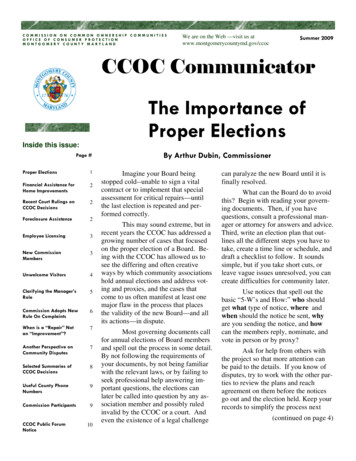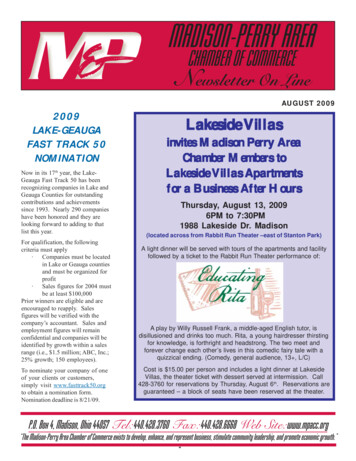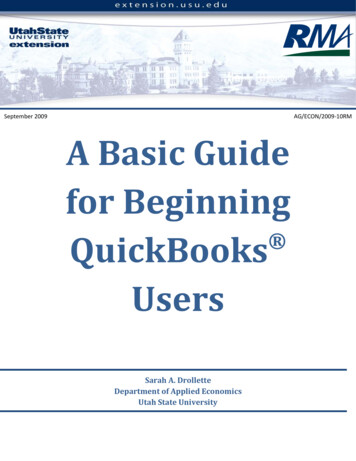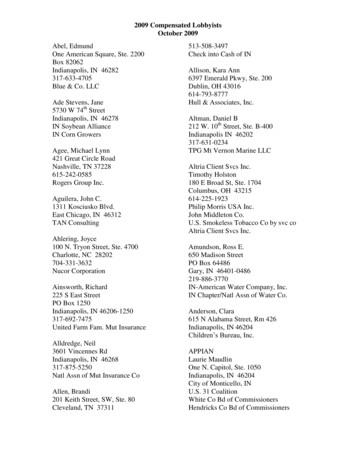
Transcription
COMMISSION ON COMMON OWNERSHIP COMMUNITIESOFFICE OF CONSUMER PROTECTIONMONTGOMERY COUNTY MARYLANDWe are on the Web —visit us atwww.montgomerycountymd.gov/ccocSummer 2009CCOC CommunicatorThe Importance ofProper ElectionsInside this issue:Page #Proper Elections1Financial Assistance forHome Improvements2Recent Court Rulings onCCOC Decisions2Foreclosure Assistance2Employee Licensing3New CommissionMembers3Unwelcome Visitors4Clarifying the Manager’sRole5Commission Adopts NewRule On Complaints6When is a “Repair” Notan “Improvement”?7Another Perspective onCommunity Disputes7Selected Summaries ofCCOC Decisions8Useful County PhoneNumbers9Commission Participants9CCOC Public ForumNotice10By Arthur Dubin, CommissionerImagine your Board beingstopped cold--unable to sign a vitalcontract or to implement that specialassessment for critical repairs—untilthe last election is repeated and performed correctly.This may sound extreme, but inrecent years the CCOC has addressed agrowing number of cases that focusedon the proper election of a Board. Being with the CCOC has allowed us tosee the differing and often creativeways by which community associationshold annual elections and address voting and proxies, and the cases thatcome to us often manifest at least onemajor flaw in the process that placesthe validity of the new Board—and allits actions—in dispute.Most governing documents callfor annual elections of Board membersand spell out the process in some detail.By not following the requirements ofyour documents, by not being familiarwith the relevant laws, or by failing toseek professional help answering important questions, the elections canlater be called into question by any association member and possibly ruledinvalid by the CCOC or a court. Andeven the existence of a legal challengecan paralyze the new Board until it isfinally resolved.What can the Board do to avoidthis? Begin with reading your governing documents. Then, if you havequestions, consult a professional manager or attorney for answers and advice.Third, write an election plan that outlines all the different steps you have totake, create a time line or schedule, anddraft a checklist to follow. It soundssimple, but if you take short cuts, orleave vague issues unresolved, you cancreate difficulties for community later.Use notices that spell out thebasic “5-W’s and How:” who shouldget what type of notice, where andwhen should the notice be sent, whyare you sending the notice, and howcan the members reply, nominate, andvote in person or by proxy?Ask for help from others withthe project so that more attention canbe paid to the details. If you know ofdisputes, try to work with the other parties to review the plans and reachagreement on them before the noticesgo out and the election held. Keep yourrecords to simplify the process next(continued on page 4)
CCOC CommunicatorSummer, 2009Page 2HOW THE COUNTY’S HOUSING DEPT.CAN HELP YOUR COMMUNITYRECENT COURT RULINGS ON CCOCDECISIONSThe Department of Housing and Community Affairs(DHCA) is one of the County's agencies that can be of directassistance to communities and their members. DHCA operatesa wide variety of housing programs, including the MPDU program, the Commission on Landlord-Tenant Affairs, HousingCode Enforcement, Weatherization Assistance and the financing of affordable housing.Final CCOC decisions are legally binding unless reversedon appeal. Appeals must be made to the County Circuit Court within30 days of the decision. If a party is unhappy with the CircuitCourt’s ruling it can appeal to the Court of Special Appeals and thento the Court of Appeals, Maryland’s highest court.DHCA can make grants and low-interest loans available to homeowners to help them finance basic improvementsto their dwellings. Applicants must meet certain income guidelines in order to qualify.Associations and members who have complaintsabout another member's failure to properly maintain his or herproperty (such as, by causing water leaks in a condominium orby refusing to repair flaking paint or a dilapidated fence) canmake confidential complaints to DHCA's Housing Code Enforcement Unit. Likewise, a member who is concerned aboutthe association's failure to fix a leak or to control a pest infestation (for example) can also make a confidential complaint toCode Enforcement. An inspector will visit the property andcan issue a violation notice against the owner of the defect, andcan file a court action if the violation is not corrected in thetime given.More information is available on DHCA's website atwww.montgomerycountymd.gov/hca. The Housing Code Enforcement number is 240-777-3785. The other programs areavailable at 240-777-3600.Two recent CCOC decisions were reversed on appeal and athird was upheld. The best-known of the cases was #71-06, Fiscinav. Devonshire East HOA. In that case, the hearing panel found thatthe HOA had committed numerous violations of State law and of itsgoverning documents, and ordered the HOA to pay the successfulhomeowner’s legal fees. The HOA appealed the award of legal fees(but not the other rulings). The Circuit Court held that the languageof the covenants did not clearly require the HOA to pay legal fees ina homeowner suit to enforce the covenants, and he reversed that partof the CCOC decision. The judge made his ruling orally and did notissue any written decision.The Court of Special Appeals handed down another important (but not officially reported) decision in #30-06, Masters v. Norbeck Grove Community Association. In that case, the lot owner constructed a massive stone outdoor fireplace, and the dispute was overwhether the HOA approved it. The evidence was clear that theowner never submitted detailed plans for the fireplace. Instead, hesubmitted detailed plans showing flower and other plantings, andclaimed they included a small penciled notation “stone fireplace.”He also claimed to have discussed the proposed stone fireplace witha member of the architectural review committee. The HOA’s witnesses testified that they did not recall seeing the notation on theplans, but they did not keep their copy of the plans. The CCOC didnot rule on whether or not the “stone fireplace” notation was on thesubmitted plans, holding instead that the rules clearly required lotowners to submit detailed plans for all new construction and therefore the lot owner had no good reason to believe that the HOA(continued on page 5)County Assistance in Avoiding ForeclosureMontgomery County is aware that many of its communities, especially condominium associations, are suffering from high rates offoreclosure and loss of assessment income. The County is responding in a variety of ways to deal with these problems. Emergency financial assistance to homeowners. The Department of Health and Human Services can provide temporary cash assistance to avoid foreclosures by paying part of the arrearages. Residents who need assistance should call HHS’s Special Needs Housing Unitat 240-7774565 or one of HHS’s regional offices (Rockville: 240-777-4550/Silver Spring: 240-777-3075/Germantown: 240-7774448). Foreclosure prevention counseling: Through the Department of Housing and Community Affairs (DHCA), the County has providedgrants to several private agencies that offer free assistance on foreclosure prevention, including restructuring existing mortgage payments tomake them more affordable. The Statewide information center is the Maryland HOPE Hotline at 1-877-462-7555. Regional agencies are:Rockville (Consumer Credit Counselling, 1-877-254-1097); Silver Spring (Latino Economic Development Corp., 1-866-977-5332 ext.7434); Gaithersburg (Home Free USA, 301-891-8400); and Germantown (Housing Initiative Partnership, 301-699-0425). Care of vacant properties: DHCA’s Housing Code Enforcement Unit will inspect vacant properties that are not being maintainedand will board them up and take other actions to preserve them. Call 240-777-3785. Emergency housing: HHS also offers temporary housing for the homeless.General information: In addition to these agencies, general information on foreclosure avoidance and foreclosure law is available onState Senator Jamie Raskin’s web site (http://senatorjaminraskin.com/files/Economic Assistance Guide.pdf) and at People’s Law(www.peoples-law.org). The CCOC encourages communities to distribute this information to all their members.
CCOC CommunicatorSummer, 2009Page 3EMPLOYEE LICENSINGThe CCOC has received several recent complaints frommembers of associations that their boards or property managershave hired unlicensed personnel to maintain the common areasand utility services.The CCOC has not yet taken any position on thesecomplaints. As a general matter, boards of directors have broaddiscretion under the governing documents to hire employees,including managers. But broad discretion does not necessarilymean complete discretion. Governing documents and masterinsurance policies may set limits on the board's authority. Forexample, some governing documents require that the board cannot hire a new manager without the approval of a majority of themortgage lenders. And some might require that personnel beproperly licensed for their jobs. In addition, it's possible that aboard decision to hire a person who is legally required to belicensed but is not, can be challenged as being contrary to publicpolicy and therefore invalid. Finally, the improper use of anunlicensed worker might be considered a violation of the board'sfiduciary duty to properly maintain the common elements.Let's review County and State requirements:Plumbers: In Montgomery County, plumbers must belicensed by the Washington Suburban Sanitary Commission(WSSC) if they perform any major plumbing repairs. This istrue even if the employee making the repairs works only for themanager or the community association. (Minor repairs, such aschanging valves or toilet mechanisms do not require a license.)Gas fitters: In Montgomery County, WSSC also requires that anyone who performs any work on a gas line, even ifit's simply hooking up a new gas stove, must be licensed as a gasfitter with WSSC.Electricians: Montgomery County's Department ofPermitting Services requires that everyone performing new electrical work or major electrical repairs must have an electricianlicense. (Minor repairs and replacements are not covered.)Boiler engineers: The Maryland Department of Labor,Licensing and Regulation (DLLR) requires that anyone maintaining a steam boiler rated at more than 15 psig or 30 horsepower,or a hot water boiler rated at more than 160 psig or 250 degreesFahrenheit, must have a Stationary Engineer's license.Heating and Air Conditioning Contractors: The Maryland DLLR also requires all heating and air conditioning contractors to be licensed, unless the person involved works only for thecoc involved or for its manager.Property Managers: At this time there are no laws inMaryland or Montgomery County that require the licensing ofproperty managers. However, out-of-state corporations musthave "foreign corporation" certificates in order to legally do business in Maryland.Home improvements: People doing work as home improvement contractors do not need licenses if they are hired bythe community associations to perform work on the commonareas. However, such people do need the Maryland Home Improvement Commission (MHIC) license, issued by DLLR, if theyperform work on behalf of a home or private unit owner on thatperson's property. Associations should not refer or recommendtheir employees or other contractors to their members to hireunless the Association verifies that the employee or contractor isproperly licensed with the MHIC, because it is illegal under Statelaw to knowingly help an unlicensed home improvement contractor do business.Boards and managers should not take the risks of doingbusiness with people who are not properly licensed to do thework needed and should always require proof of a license.This article is intended only as a review of the relevantlicensing laws, and not as an opinion or projection of how theCCOC might rule on any dispute coming before it.****Commission Welcomes New MembersThree new members were appointed to the CCOC in January and a fourth in July: Stephen Greenspan, MariaGarcia, Paul Nettleford and Elizabeth Molloy. They will replace Commissioners Jeff Kivitz, Clara Perlingiero, CarolynThompson, and Vicki Vergagni, who will be sorely missed. (The first three are appointed to 3-year terms; Ms. Molloywas appointed in July to fill the remainder of Ms. Vergagni’s term after she resigned earlier this year.)
CCOC CommunicatorCCOC CommunicatorSummer, 2009Page 4ELECTING A BOARD OF DIRECTORS (continued from p.1)time, to reuse what worked well, and to improve the forms and processes that need adjustment.The repercussions of a challenged election cost the Association time and moneyand, most importantly, the good will of the community. Early and thorough planning, and arespect for the details of the process will reduce the likelihood of a challenge and improvethe chances that the elections will be upheld if there is a challenge. The CCOC and thecourts always look to the details of the process as required by the Association’s own documents, the process actually followed, and the forms used in the process, when they examinecomplaints over disputed elections. The old colloquialism that “an ounce of prevention isworth a pound of cure” is certainly true here.ARE YOU READY FOR THE CIMICIDAE?Cimicidae, or cimex lectularius, are the fancy names for a plain pest: the common bedbug. Banished from the average household for two generations, bedbugs are making an unwelcome comeback inthe US. Many DC area landlords are reporting a major surge in bedbug infestations, and CCOC’s own staffis beginning to receive complaints and inquiries about them for the first time. If rentals have the problem,can condos be far behind? It’s important that condominium managers and boards learn now how to recognize and deal effectively with the problem before it appears in their communities.Anyone can bring home bedbugs. They seem to arrive most often either in contaminated furniture, or in the luggage of travelers. (Bedbugs are becoming more common in hotels, where they can crawlinto, or leave eggs inside, luggage that is left open at night.) Bedbugs can live as long as a year withoutfeeding, so a problem might not show up right away.Bedbugs cannot be dealt with by ordinary pest control methods. The treatments used forother pests like ants, roaches and fleas rely heavily on bait traps and the spraying of chemicals into theperimeters of an infested unit. Bedbugs ignore bait traps, since they feed off human and animal blood;and they live close to humans in bedding, bedframes, and stuffed furniture, where chemical pesticides cannot be safely used. Experts also doubt that fogging (or “bombing”) a room is effective because it doesn’treach the most likely nesting places. Using the wrong methods can cause the infestation to spread.Careless disposal of infested materials can easily spread the infestation. Dragging infestedmattresses or furniture down a hallway can cause bugs or eggs to fall off, thus spreading them through thebuilding; storing such items inside or adjacent to the building allows the bugs to wander back in; suchitems should be defaced or destroyed lest another resident unknowingly bring them back inside to be reused. (Bag the items whenever possible before moving them.)Managers should prepare now. First, they should find out which professional exterminatorshave been trained to deal with bedbugs, and keep their names and phone numbers available. Second,they should know how they will remove and store any contaminated items. Third, they should obtain andkeep copies of materials on recognizing and dealing with such infestations so that they can give them toany residents to assist them in eliminating the problem quickly and before it spreads.Many useful guides on bedbugs can be downloaded from the Internet. Some recommended sitesare the Harvard School of Public Health (www.hsph.harvard.edu/bedbugs/); the Mayo Clinic(www.mayoclinic.com/health/bedbugs/), the University of Kentucky Cooperative Extension asp); BedBug Central (www.bedbugcentral.com); and Cooper Pest Solutions (www.cooperpest.com/factsheets/Your Guide to Bedbugs.pdf).
CCOC CommunicatorCCOC CommunicatorSummer, 2009Page 5CLARIFYING THE MANAGER’S ROLEMany of our associations employ highly-qualified professional community managers, and we think residents should know what the manager has-and has not-been hired to do. The manager has two primary responsibilities: to carry out policies set by the board and to managethe association’s daily operations.Some residents expect the manager to perform certain tasks that just aren’t part of the job. When the manager doesn’t meet those expectations, residents naturally are unhappy. Since we want you to be happy, we’re offering a few clarifications to help you understand what themanager does. The manager is trained to deal with conflict, but he or she will not get involved in quarrels you might be having with your neighbor.However, if association rules are being violated, the manager is the right person to call.While the manager works closely with the board, he or she is an advisor, not a member of the board. Also, the manager is not youradvocate with or conduit to the board. If you have a concern, send a letter or e-mail directly to the board.Although the manager works for the board, he or she is available to residents. That doesn’t mean the manager will drop everything totake your call. If you need to see the manager, call and arrange a meeting. If a matter is so urgent that you need an immediate response,call the association number or 911.The manager is always happy to answer questions, but he or she is not the information officer. For routine inquiries, like the date of thenext meeting, please read the newsletter or check the association website.The manager is responsible for monitoring contractors’ performance, but not supervising them. Contractors are responsible for supervising their own personnel. If you have a problem with a contractor, notify the manager, who will forward your concerns to the board.The board will decide how to proceed under the terms of the contract.The manager inspects the community regularly, but even an experienced manager won’t catch everything. Your help is essential. If youknow about a potential maintenance issue, report it to the manager.The manager does not set policy. If you disagree with a policy or rule, you’ll get better results sending a letter or e-mail to the boardthan arguing with the manager.The manager has a broad range of expertise, but he or she is not a consultant to the residents. Neither is he or she an engineer, architect,attorney or accountant. The manager may offer opinions, but don’t expect technical advice in areas where he or she is not qualified.Although the manager is great resource to the association, he or she is not available 24 hours a day-except for emergencies. Getting lockedout of your home may be an emergency to you, but it isn’t an association emergency. An association emergency is defined as a threat to lifeor property.***The CCOC in the Courts (continued from page 2)had approved the details of his fireplace. The Courts disagreed. Both Courts found that the disputed notation was in fact on the landscapingplan and that the owner had in fact discussed the fireplace with one member of the architectural committee. Therefore, the HOA had noticeof the fireplace and the duty to respond to it and to inform the owner it was not approved; otherwise, the owner had good reason to believethe HOA had no objections.Finally, the Court of Special Appeals (in another unreported decision) upheld the CCOC ruling in #35-06, Castle Gate HOA v.Greenfield, in which the CCOC had ordered a townhome owner to remove a
Plumbers: In Montgomery County, plumbers must be licensed by the Washington Suburban Sanitary Commission (WSSC) if they perform any major plumbing repairs. This is true even if the employee making the repairs works only for the manager or the community association. (Minor repairs, such as











